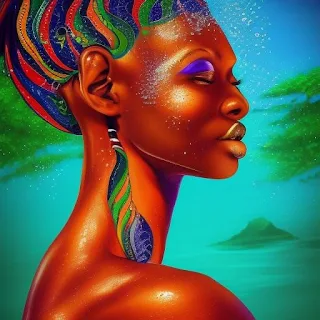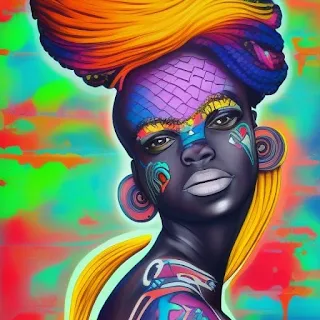Swimming with the Kingdom of Laluba Mermaids African Folktale encourages us to embrace the natural world as a source of wonder and peace.
 |
| Ujua the River Mermaid |
African Folktale Swimming with the Mermaids: Ujua's Adventure in the River
As the elders say, there was a woman named Ujua who lived in a small fishing town in Ghana. She was known for her constant grumpiness and bad temper, and no matter what anyone did to make her happy, she was never satisfied. Her sour disposition made everyone around her miserable, and they often avoided her company.
One day, Ujua went to the Naserian Enkare river to fish, hoping that it would cheer her up. As she was casting her line, she noticed a beautiful mermaid swimming towards her. Ujua was initially frightened, but the mermaid assured her that she meant no harm. The mermaid asked Ujua why she was so unhappy, and Ujua poured out her heart to the mermaid, telling her about all her problems.
The mermaid listened patiently and then offered to take Ujua with her to the underground mermaid kingdom of Laluba, where she could find peace and happiness. Ujua was hesitant at first but eventually agreed to go with the mermaid.
When they arrived at Laluba, Ujua was amazed by the beauty of the underwater kingdom. The mermaids welcomed her with open arms and showed her around. She saw coral reefs, schools of fish, and other wondrous sea creatures that she had never seen before.
Ujua was given a beautiful underwater home, and she began to feel happy for the first time in her life. She spent her days swimming with the mermaids, exploring the ocean, and learning about the underwater world. She no longer felt the need to make other people around her miserable because she was finally content and at peace.
Years passed, and Ujua grew old. The mermaids held a grand ceremony to celebrate her life, and they told stories about how she had brought joy and happiness to their kingdom. Ujua passed away, but her legacy lived on in the hearts of the mermaids who had come to love her.
From that day on, whenever a grumpy person came to the river, the mermaids would appear to them and offer to take them to Laluba. And just like Ujua, these people would find peace and happiness living amongst the mermaids.
 |
Kingdom of Laluba Mermaid. |
There is beauty and wonder in the natural world, and we can find peace and happiness by immersing ourselves in it. Ujua found happiness by exploring the underwater world and learning about the mermaids and the Naserian Enkare river secret to happiness. Sometimes, unexpected encounters can lead to life-changing experiences.
The natural world is full of beauty and wonder, and exploring it can bring a sense of peace and awe that is hard to find in other places. Rivers, oceans, forests, and trees are just a few examples of the many wonders that nature has to offer. Rivers are some of the most fascinating natural features on our planet. They flow through landscapes and connect bodies of water, providing essential habitats for many plant and animal species including mermaids.
The natural world is a source of endless beauty and wonder, and exploring its many wonders can be a deeply enriching and rewarding experience. From rivers and oceans to forests and trees, the natural world is a treasure trove of sights, sounds, and experiences just waiting to be discovered.
 |
| Naserian Enkare river mermaid. |












